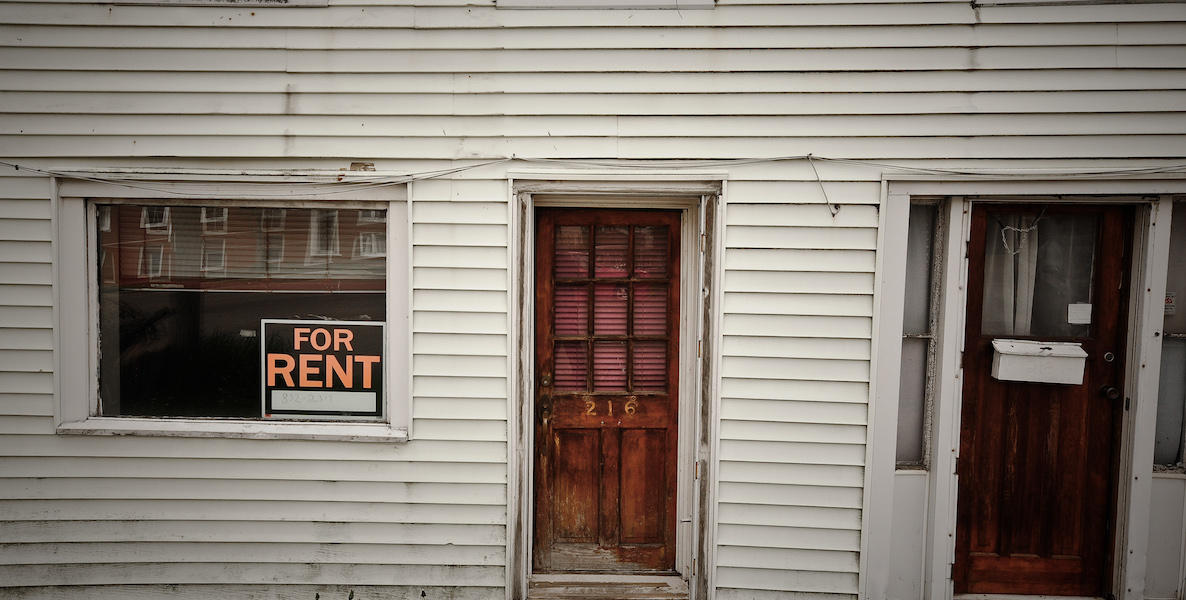About a month ago, Housing and Urban Development Secretary Ben Carson visited Philadelphia during a flash tour of the city’s Pathways to Housing PA program, offering surface words of promise on the fate of public housing.
“I think we are starting to learn that it actually costs less to society to take care of people than to not take care of them,” PlanPhilly reported Carson saying at the time. “Not to mention that people are resources and we have an obligation to take care of them.” Interesting words, thought many, from a man who seems ardently committed to dismantling the federal agency’s mission to expand fair housing and desegregated neighborhoods.
Be Part of the Solution
Become a Citizen member.Either Carson really meant that, or he had a completely different version in mind when he said it. Just weeks later, a recent legislative proposal has surfaced in which the HUD Secretary has proposed tripling the rent poor, low-income people pay for subsidized public housing. And, in fulfilling a refreshed Trumpian push towards “welfare reform,” he’ll allow housing agencies to force unemployed individuals to get a gig in exchange for any subsidy.

Prefer the audio version of this article? Listen to this story in CitizenCast below:

Expecting people to look for work is one thing. But what the HUD proposal—or any proposal from the federal government—does not include are job training programs, an increase to the minimum (not-livable) wage, and jobs that allow people to pay their rent. Given the current political make-up of Washington these days, Philadelphia’s nearly 80,000 public housing tenants should brace for this impending reality.
The alarming scenario Carson’s plan presents may trigger the kind of creative response that’s been needed for some time, other than the rising-tide-lifts-all-boats-plus-tax-everything approach the city has preferred for quite some time.
There’s no question that spiked public housing rent is going to put a real pinch on folks. As it stands, recipients of HUD rental assistance typically spend 30 percent of income on housing; the Carson proposal recommends increasing that to 35 percent of gross income (with it being applied to federal minimum wage of $7.25 and working a minimum of 15 hours per week).
The way this is being presented suggests a narrow-minded assumption that folks can actually live off a federal minimum wage and take a hit in their rental contribution. The poorest public housing tenants will get crushed, particularly those who pay a minimum monthly $50 under HUD’s long time Section 8 Housing Choice Voucher program; that will increase to $150 under this proposal.
![]() One Reality Check listener who works in public housing claims there are PHA tenants-in-need who currently pay a $25 minimum (the city obviously kicking in some funding). With this federal proposal, that’s jacked up to $75 a month. The expectation from Carson, who once falsely boasted that he grew up in Detroit public housing, is that hiked rent will be no problem: his job mandate will immediately put money in poor folks’ pockets. But that assumes this government will smartly introduce those people to those jobs. How confident are you that that will happen?
One Reality Check listener who works in public housing claims there are PHA tenants-in-need who currently pay a $25 minimum (the city obviously kicking in some funding). With this federal proposal, that’s jacked up to $75 a month. The expectation from Carson, who once falsely boasted that he grew up in Detroit public housing, is that hiked rent will be no problem: his job mandate will immediately put money in poor folks’ pockets. But that assumes this government will smartly introduce those people to those jobs. How confident are you that that will happen?
But according to HUD’s own analysis, more than 42 percent of severely low-income renters in Philadelphia are “worst case needs” scenarios, meaning they are making less than half the city’s median income of $43,000 (that’s barely $21,500 a year). That’s an estimated 145,000 residents dealing with those circumstances—or nearly 3 percent of the city population. For Philadelphia Housing Authority renters, the average income is actually below $14,000 with average rent of $331 a month.
Carson’s rationale is that HUD has already drained way too much of its budget on rent. Indeed, three major HUD programs focused on rent—Section 8 tenant-based rental assistance, Section 8 project-based rental assistance and Section 8 Housing Choice Vouchers—do eat up about three quarters of the HUD budget. But rather than look more closely for better efficiencies and a new path forward that doesn’t create more social instability, HUD’s Carson proposes that he play the role of federal slumlord, instead.
A looming question is how Philadelphia handles that.
According to HUD’s own analysis, more than 42 percent of severely low-income renters in Philadelphia are “worst case needs” scenarios, meaning they are making less than half the city’s median income of $43,000 (that’s barely $21,500 a year). That’s an estimated 145,000 residents dealing with those circumstances.
At the outset, City Hall should consider suing HUD for housing discrimination and reckless endangerment. Why not? It’s suing as a sanctuary city, and risking federal dollars in the process, already. And it hasn’t shied away from suing a big bank like Wells Fargo for predatory lending. With its status as poorest big city, it’s fairly easy for Philly to highlight its worst socio-economic indicators and illustrate, before courts, that such a move singles out, stigmatizes and discriminates against the city’s poorest tenants. And not only puts public housing tenants at risk, but it also endangers the city due to the inevitable harm it poses to all residents directly and indirectly impacted.
There is a small silver lining in this development. Given the boldness of the proposal and a partisan climate on Capitol Hill that can advance it, perhaps this is the crisis that will spur Philadelphia into greater action around its rental crisis. So far, city leaders and advocates have not been able to grasp the magnitude of Philly’s rental problems, particularly as it relates to the city’s poorest residents.
Everyone keeps calling it an “affordable housing” crisis as if everyone owns a home or as if the city doesn’t have an income crisis either. Maybe we stop sugar-coating it. The alarming scenario Carson’s plan presents may trigger the kind of creative response that’s been needed for some time, other than the rising-tide-lifts-all-boats-plus-tax-everything approach the city has preferred for quite some time as a result of a hot real estate market.
Yet, that marketability and the lively, attractive, tourist-attraction space that it creates is all for naught if you’ve suddenly got a mass eviction moment on your hands quickly going sideways into ugly public housing unrest. That’s powder keg inequality that adds up to few benefits (if any) to all involved and within proximity of it—which amounts to the entire region.
![]() One immediate fix, should the proposal take effect, is for the City to reform its long-standing property tax abatement. City Controller Rebecca Rynhart released a report last week that suggested several ways this could happen including: capping the property value for an abatement at $700,000, which would have raised an additional $5.8 million for the City in 2016; eliminating it from the highest-income zip codes, which would have raised $5 million; or just taxing the amount that would go to the City’s general fund, which would have meant an additional $5.7 million. Perhaps funds generated from a fiscal redress of that sort could go into a housing trust fund for low-income renters to offset the federal rent hike.
One immediate fix, should the proposal take effect, is for the City to reform its long-standing property tax abatement. City Controller Rebecca Rynhart released a report last week that suggested several ways this could happen including: capping the property value for an abatement at $700,000, which would have raised an additional $5.8 million for the City in 2016; eliminating it from the highest-income zip codes, which would have raised $5 million; or just taxing the amount that would go to the City’s general fund, which would have meant an additional $5.7 million. Perhaps funds generated from a fiscal redress of that sort could go into a housing trust fund for low-income renters to offset the federal rent hike.
And, City Council needs to work with the business community to find a jobs-based solution to the problem of unaffordable rent; after all, if more people had jobs that paid a living wage, the rents would suddenly seem much lower. As Citizen Contributor Diana Lind correctly points out, Philly really faces much more of a jobs problem than a housing problem. How can you pay any rent when you’re not generating any income? Hence, recognition of a rental crisis must simultaneously align with recognition of a jobs crisis, particularly for low income Philadelphians.
Philadelphia really must arrive at a new moment where it reimagines itself as an affordable and livable city; these shouldn’t be divorced demands, and it shouldn’t be suggested or pushed (through prejudice) that it’s only affordable or livable for a certain type of person.
Charles D. Ellison is Executive Producer and Host of “Reality Check,” which airs Monday-Thursday, 4-7 p.m. on WURD Radio (96.1FM/900AM). Check out The Citizen’s weekly segment on his show every Tuesday at 6 p.m. Ellison is also Principal of B|E Strategy, the Washington Correspondent for The Philadelphia Tribune and Contributing Politics Editor to TheRoot.com. Catch him if you can @ellisonreport on Twitter.
Header: Wikimedia





